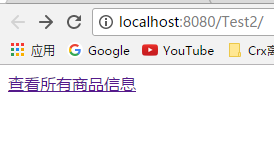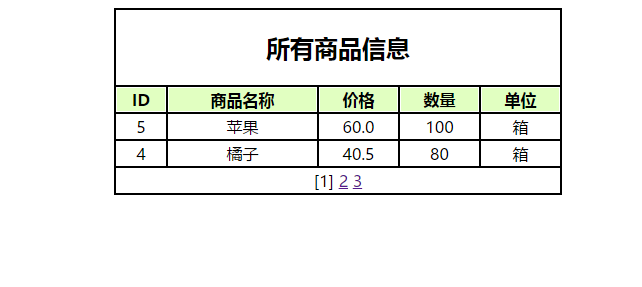---恢复内容开始---
分页查询
分页查询是java web开发中经常使用到的技术。在数据库中数据量非常大的情况下,不适合将所有的数据全部显示到一个页面中,同时为了节约程序以及数据库的资源,就需要对数据进行分页查询操作。
通过JDBC实现分页的方法比较多,而且不同的数据库机制其分页的方式也不同,这里我们介绍典型的两个分页方法。
1.通过ResultSet的光标实现分页
该分页方法可以在各种数据库之间通用,但是带来的缺点是占用了大量的资源,不适合在数据库大的情况下使用。
2.通过数据库机制进行分页
很多数据库都会提供这种分页机制,例如SQLServer中就提供了top关键字,mysql数据库中提供了limit关键字,用这些关键字都可以设置数据返回的记录数。使用这种分页查询方式可以减少数据库的资源开销,提高程序效率,但是缺点是只适应于一种数据库。
注:因为第一种不适合在数据量大的情况下使用,所以在实际开发中也不使用该方式来查询数据,我们只对第二种方式做介绍
例:通过mysql的数据分页机制来实现商品信息的分页查询功能,并将信息显示在jsp页面中
(1)创建一个商品信息属性Product类,用来保存商品属性,此类为JavaBean

1 package com.bean; 2 3 public class Product { 4 public static final int PAGE_SIZE = 2; //每一页显示几行数据 5 //编号 6 private int id; 7 //名称 8 private String name; 9 //价格 10 private double price; 11 //数量 12 private int num; 13 //单位 14 private String unit; 15 public int getId() { 16 return id; 17 } 18 public void setId(int id) { 19 this.id = id; 20 } 21 public String getName() { 22 return name; 23 } 24 public void setName(String name) { 25 this.name = name; 26 } 27 public double getPrice() { 28 return price; 29 } 30 public void setPrice(double price) { 31 this.price = price; 32 } 33 public int getNum() { 34 return num; 35 } 36 public void setNum(int num) { 37 this.num = num; 38 } 39 public String getUnit() { 40 return unit; 41 } 42 public void setUnit(String unit) { 43 this.unit = unit; 44 } 45 } 46 47 Product.java代码
java中一般静态常量我们采用大写字母表示。这是一种java书写规范
(2)创建BookDao类,此类中主要实现了getConnection()方法连接到数据库的操作以及分页查询所有信息的方法find(int page)、查询记录总数的方法findCount()。代码如下:

1 package com.bean; 2 import java.sql.Connection; 3 import java.sql.DriverManager; 4 import java.sql.PreparedStatement; 5 import java.sql.ResultSet; 6 import java.sql.SQLException; 7 import java.sql.Statement; 8 import java.util.ArrayList; 9 import java.util.List; 10 public class BookDao { 11 public Connection getConnection() { 12 //数据库连接 13 Connection conn = null; 14 try { 15 //加载数据库驱动,注册到驱动管理器 16 Class.forName("com.mysql.jdbc.Driver"); 17 //数据库连接字符串 18 String url = "jdbc:mysql://localhost:3306/db_database10"; 19 //数据库用户名 20 String username = "root"; 21 //数据库密码 22 String password = "123456"; 23 //创建Connection连接 24 conn = DriverManager.getConnection(url,username,password); 25 26 }catch(ClassNotFoundException e) { 27 e.printStackTrace(); 28 }catch(SQLException e) { 29 e.printStackTrace(); 30 } 31 return conn; 32 } 33 34 /** 35 * 分页查询所有信息 36 * @param page 页数 37 * @return List<Product> 38 */ 39 public List<Product> find(int page){ 40 41 //创建List 42 List<Product> list = new ArrayList<Product>(); 43 //获取数据库连接 44 Connection conn = getConnection(); 45 //分页查询的SQL语句 46 String sql = "select * from tb_product order by id desc limit ?,?"; 47 try { 48 //获取PreparedStatement 49 PreparedStatement ps = conn.prepareStatement(sql); 50 //SQL语句中的第1个参数赋值 51 ps.setInt(1, (page - 1) * Product.PAGE_SIZE); 52 //对SQL语句中的第2个参数赋值 53 ps.setInt(2, Product.PAGE_SIZE); 54 //执行查询操作 55 ResultSet rs = ps.executeQuery(); 56 //光标向后移动,并判断是否有效 57 while(rs.next()) { 58 //实例化Product 59 Product p = new Product(); 60 //对id属性赋值 61 p.setId(rs.getInt("id")); 62 //对name属性赋值 63 p.setName(rs.getString("name")); 64 //对num属性赋值 65 p.setNum(rs.getInt("num")); 66 //对price属性赋值 67 p.setPrice(rs.getDouble("price")); 68 //对unit属性赋值 69 p.setUnit(rs.getString("unit")); 70 //将Product添加到List结合中 71 list.add(p); 72 } 73 //关闭ResultSet 74 rs.close(); 75 //关闭PreparedStatement 76 ps.close(); 77 //关闭Connection 78 conn.close(); 79 }catch(SQLException e) { 80 e.printStackTrace(); 81 } 82 return list; 83 84 } 85 /** 86 * 查询记录总数 87 * @return count记录数 88 */ 89 public int findCount() { 90 //总记录数 91 int count = 0; 92 //获取数据库连接 93 Connection conn = getConnection(); 94 //查询总记录数SQL语句 95 String sql = "select count(*) from tb_product"; 96 try { 97 //创建Statement 98 Statement stmt = conn.createStatement(); 99 //查询并获取ResultSet 100 ResultSet rs = stmt.executeQuery(sql); 101 //光标向后移动,并判断是否有效 102 if(rs.next()) { 103 //取出id字段的值对总记录赋值 104 count = rs.getInt(1); 105 } 106 //关闭ResultSet 107 rs.close(); 108 //关闭Connection 109 conn.close(); 110 }catch(SQLException e) { 111 e.printStackTrace(); 112 } 113 //返回总记录 114 return count; 115 } 116 117 }
说明:MySQL中分页查询机制关键词limit的说明,具体语法为:select * from 表名 order by id "升序(asc)或降序(desc)" limit arg1,arg2;
在SQLServes数据库中可以使用top关键字来查询:select top pageSize from "表名" where id not in (select top arg id from "表名");该条语句表示含义:从表中取出前arg条数据,再从表中取出不包含前arg条数据的pageSize条数据。例如:一页显示3条数据,那么第一页就是从表中取出前0条数据,再从表中取出不包含前0条数据的另外三条数据;第二页的数据就是从表中取出前3条数据,再从表中取出不包含取出的前3条数据的另外3条数据。"pageSize表示一页显示的条数",“arg表示从表中取出前几条数据”
limit arg1,arg2
参数说明:
arg1:用于指定查询记录的起始位置。
arg2:用于指定查询数据所返回的记录数。
(3)创建一个Servlet ,类名为FindServlet类此类继承了HttpServlet,主要实现了doGet()方法,接收和处理jsp页面中提交来的表单数据,代码如下:

1 package com.servlet; 2 import java.io.IOException; 3 import java.util.List; 4 import javax.servlet.ServletException; 5 import javax.servlet.http.HttpServlet; 6 import javax.servlet.http.HttpServletRequest; 7 import javax.servlet.http.HttpServletResponse; 8 import com.bean.BookDao; 9 import com.bean.Product; 10 11 public class FindServlet extends HttpServlet { 12 private static final long serialVersionUID = 1L; 13 14 protected void doGet(HttpServletRequest request,HttpServletResponse response) throws ServletException,IOException{ 15 //当前页码 16 int currPage = 1; 17 //判断传递页码是否有效 18 if(request.getParameter("page") != null) { 19 //对当前页码赋值 20 currPage = Integer.parseInt(request.getParameter("page")); 21 } 22 //实例化ProductDao 23 BookDao dao = new BookDao(); 24 //查询所有商品信息 25 List<Product> list = dao.find(currPage); 26 //将list放置到request中 27 request.setAttribute("list", list); 28 //总页数 29 int pages; 30 //查询总记录数 31 int count = dao.findCount(); 32 //计算总页数 33 if(count % Product.PAGE_SIZE == 0) { 34 //对总页数赋值 35 pages = count / Product.PAGE_SIZE; 36 }else { 37 //对总页数赋值 38 pages = count / Product.PAGE_SIZE + 1; 39 } 40 //实例化StringBuffer 41 StringBuffer sb = new StringBuffer(); 42 //通过循环构建分页条 43 for(int i=1;i<=pages;i++) { 44 //判断是否为当前页 45 if(i == currPage) { 46 //构建分页条 47 sb.append("[" + i + "]"); 48 }else { 49 //构建分页条 50 sb.append("<a href='FindServlet?page=" + i + "'>" + i + "</a>"); 51 } 52 sb.append(" "); 53 } 54 //将分页条的字符串放置到request中 55 request.setAttribute("bar", sb.toString()); 56 //转发到product_list.jsp页面 57 request.getRequestDispatcher("product_list.jsp").forward(request, response); 58 } 59 }
注意:分页条在JSP页面中是动态内容,每次查看新页面都要重新构造,所以,实例中将分页的构造放置到Servlet中,以简化JSP页面的代码。
request.getParameter("page")中的“page”是打开jsp页面时所带的参数,例如:“http://localhost:8080/test.jsp?page=2”此时page的参数就是2。此外“page”也是Http规范中定义好的,无需要再定义,直接通过request.getParameter("page")获取即可。
在获取查询结果集List与分页条后,FindServlet1分别将这两个对象放置到request中,将请求转发到product_list.jsp页面做出显示.
(4)创建product_list.jsp页面,通过查询List结果集对象来将结果显示在页面

1 <%@ page language="java" contentType="text/html; charset=UTF-8" 2 pageEncoding="UTF-8"%> 3 <%@ page import="java.util.List" %> 4 <%@ page import="com.bean.Product" %> 5 <!DOCTYPE html PUBLIC "-//W3C//DTD HTML 4.01 Transitional//EN" "http://www.w3.org/TR/html4/loose.dtd"> 6 <html> 7 <head> 8 <meta http-equiv="Content-Type" content="text/html; charset=UTF-8"> 9 <title>所有商品信息</title> 10 </head> 11 <body> 12 <table align="center" width="450px" border="1" height="180px" bordercolor="white" bgcolor="black" cellpadding="1"> 13 <tr bgcolor="white"> 14 <td align="center" colspan="5"> 15 <h2>所有商品信息</h2> 16 </td> 17 </tr> 18 <tr align="center" bgcolor="#e1ffc1"> 19 <td><b>ID</b></td> 20 <td><b>商品名称</b></td> 21 <td><b>价格</b></td> 22 <td><b>数量</b></td> 23 <td><b>单位</b></td> 24 </tr> 25 <% 26 List<Product> list = (List<Product>)request.getAttribute("list"); 27 for(Product p:list){ 28 %> 29 <tr align="center" bgcolor="white"> 30 <td><%=p.getId() %></td> 31 <td><%=p.getName() %></td> 32 <td><%=p.getPrice() %></td> 33 <td><%=p.getNum() %></td> 34 <td><%=p.getUnit() %></td> 35 </tr> 36 <% 37 } 38 %> 39 <tr> 40 <td align="center" colspan="5" bgcolor="white"> 41 <%=request.getAttribute("bar") %> 42 </td> 43 </tr> 44 45 </table> 46 </body> 47 </html>
(5)创建index.jsp页面,在该页面中创建了一个指向FindServlet类的超链接,用来查询商品信息

1 <%@ page language="java" contentType="text/html; charset=UTF-8" 2 pageEncoding="UTF-8"%> 3 <!DOCTYPE html PUBLIC "-//W3C//DTD HTML 4.01 Transitional//EN" "http://www.w3.org/TR/html4/loose.dtd"> 4 <html> 5 <head> 6 <meta http-equiv="Content-Type" content="text/html; charset=UTF-8"> 7 <title>分页数据查询</title> 8 </head> 9 <body> 10 <a href="FindServlet">查看所有商品信息</a> 11 </body> 12 </html>
(6)web.xml中的Servlet配置信息如下:

1 <?xml version="1.0" encoding="UTF-8"?> 2 <web-app xmlns:xsi="http://www.w3.org/2001/XMLSchema-instance" xmlns="http://java.sun.com/xml/ns/javaee" xsi:schemaLocation="http://java.sun.com/xml/ns/javaee http://java.sun.com/xml/ns/javaee/web-app_3_0.xsd" id="WebApp_ID" version="3.0"> 3 <display-name>Test2</display-name> 4 <welcome-file-list> 5 <welcome-file>index.html</welcome-file> 6 <welcome-file>index.htm</welcome-file> 7 <welcome-file>index.jsp</welcome-file> 8 <welcome-file>default.html</welcome-file> 9 <welcome-file>default.htm</welcome-file> 10 <welcome-file>default.jsp</welcome-file> 11 </welcome-file-list> 12 <servlet> 13 <servlet-name>FindServlet</servlet-name> 14 <servlet-class>com.servlet.FindServlet</servlet-class> 15 </servlet> 16 <servlet-mapping> 17 <servlet-name>FindServlet</servlet-name> 18 <url-pattern>/FindServlet</url-pattern> 19 </servlet-mapping> 20 </web-app>
配置完成后运行项目结果:


---恢复内容结束---
分页查询
分页查询是java web开发中经常使用到的技术。在数据库中数据量非常大的情况下,不适合将所有的数据全部显示到一个页面中,同时为了节约程序以及数据库的资源,就需要对数据进行分页查询操作。
通过JDBC实现分页的方法比较多,而且不同的数据库机制其分页的方式也不同,这里我们介绍典型的两个分页方法。
1.通过ResultSet的光标实现分页
该分页方法可以在各种数据库之间通用,但是带来的缺点是占用了大量的资源,不适合在数据库大的情况下使用。
2.通过数据库机制进行分页
很多数据库都会提供这种分页机制,例如SQLServer中就提供了top关键字,mysql数据库中提供了limit关键字,用这些关键字都可以设置数据返回的记录数。使用这种分页查询方式可以减少数据库的资源开销,提高程序效率,但是缺点是只适应于一种数据库。
注:因为第一种不适合在数据量大的情况下使用,所以在实际开发中也不使用该方式来查询数据,我们只对第二种方式做介绍
例:通过mysql的数据分页机制来实现商品信息的分页查询功能,并将信息显示在jsp页面中
(1)创建一个商品信息属性Product类,用来保存商品属性,此类为JavaBean

1 package com.bean; 2 3 public class Product { 4 public static final int PAGE_SIZE = 2; //每一页显示几行数据 5 //编号 6 private int id; 7 //名称 8 private String name; 9 //价格 10 private double price; 11 //数量 12 private int num; 13 //单位 14 private String unit; 15 public int getId() { 16 return id; 17 } 18 public void setId(int id) { 19 this.id = id; 20 } 21 public String getName() { 22 return name; 23 } 24 public void setName(String name) { 25 this.name = name; 26 } 27 public double getPrice() { 28 return price; 29 } 30 public void setPrice(double price) { 31 this.price = price; 32 } 33 public int getNum() { 34 return num; 35 } 36 public void setNum(int num) { 37 this.num = num; 38 } 39 public String getUnit() { 40 return unit; 41 } 42 public void setUnit(String unit) { 43 this.unit = unit; 44 } 45 } 46 47 Product.java代码
java中一般静态常量我们采用大写字母表示。这是一种java书写规范
(2)创建BookDao类,此类中主要实现了getConnection()方法连接到数据库的操作以及分页查询所有信息的方法find(int page)、查询记录总数的方法findCount()。代码如下:

1 package com.bean; 2 import java.sql.Connection; 3 import java.sql.DriverManager; 4 import java.sql.PreparedStatement; 5 import java.sql.ResultSet; 6 import java.sql.SQLException; 7 import java.sql.Statement; 8 import java.util.ArrayList; 9 import java.util.List; 10 public class BookDao { 11 public Connection getConnection() { 12 //数据库连接 13 Connection conn = null; 14 try { 15 //加载数据库驱动,注册到驱动管理器 16 Class.forName("com.mysql.jdbc.Driver"); 17 //数据库连接字符串 18 String url = "jdbc:mysql://localhost:3306/db_database10"; 19 //数据库用户名 20 String username = "root"; 21 //数据库密码 22 String password = "123456"; 23 //创建Connection连接 24 conn = DriverManager.getConnection(url,username,password); 25 26 }catch(ClassNotFoundException e) { 27 e.printStackTrace(); 28 }catch(SQLException e) { 29 e.printStackTrace(); 30 } 31 return conn; 32 } 33 34 /** 35 * 分页查询所有信息 36 * @param page 页数 37 * @return List<Product> 38 */ 39 public List<Product> find(int page){ 40 41 //创建List 42 List<Product> list = new ArrayList<Product>(); 43 //获取数据库连接 44 Connection conn = getConnection(); 45 //分页查询的SQL语句 46 String sql = "select * from tb_product order by id desc limit ?,?"; 47 try { 48 //获取PreparedStatement 49 PreparedStatement ps = conn.prepareStatement(sql); 50 //SQL语句中的第1个参数赋值 51 ps.setInt(1, (page - 1) * Product.PAGE_SIZE); 52 //对SQL语句中的第2个参数赋值 53 ps.setInt(2, Product.PAGE_SIZE); 54 //执行查询操作 55 ResultSet rs = ps.executeQuery(); 56 //光标向后移动,并判断是否有效 57 while(rs.next()) { 58 //实例化Product 59 Product p = new Product(); 60 //对id属性赋值 61 p.setId(rs.getInt("id")); 62 //对name属性赋值 63 p.setName(rs.getString("name")); 64 //对num属性赋值 65 p.setNum(rs.getInt("num")); 66 //对price属性赋值 67 p.setPrice(rs.getDouble("price")); 68 //对unit属性赋值 69 p.setUnit(rs.getString("unit")); 70 //将Product添加到List结合中 71 list.add(p); 72 } 73 //关闭ResultSet 74 rs.close(); 75 //关闭PreparedStatement 76 ps.close(); 77 //关闭Connection 78 conn.close(); 79 }catch(SQLException e) { 80 e.printStackTrace(); 81 } 82 return list; 83 84 } 85 /** 86 * 查询记录总数 87 * @return count记录数 88 */ 89 public int findCount() { 90 //总记录数 91 int count = 0; 92 //获取数据库连接 93 Connection conn = getConnection(); 94 //查询总记录数SQL语句 95 String sql = "select count(*) from tb_product"; 96 try { 97 //创建Statement 98 Statement stmt = conn.createStatement(); 99 //查询并获取ResultSet 100 ResultSet rs = stmt.executeQuery(sql); 101 //光标向后移动,并判断是否有效 102 if(rs.next()) { 103 //取出id字段的值对总记录赋值 104 count = rs.getInt(1); 105 } 106 //关闭ResultSet 107 rs.close(); 108 //关闭Connection 109 conn.close(); 110 }catch(SQLException e) { 111 e.printStackTrace(); 112 } 113 //返回总记录 114 return count; 115 } 116 117 }
说明:MySQL中分页查询机制关键词limit的说明
limit arg1,arg2
参数说明:
arg1:用于指定查询记录的起始位置。
arg2:用于指定查询数据所返回的记录数。
(3)创建一个Servlet ,类名为FindServlet类此类继承了HttpServlet,主要实现了doGet()方法,接收和处理jsp页面中提交来的表单数据,代码如下:

1 package com.servlet; 2 import java.io.IOException; 3 import java.util.List; 4 import javax.servlet.ServletException; 5 import javax.servlet.http.HttpServlet; 6 import javax.servlet.http.HttpServletRequest; 7 import javax.servlet.http.HttpServletResponse; 8 import com.bean.BookDao; 9 import com.bean.Product; 10 11 public class FindServlet extends HttpServlet { 12 private static final long serialVersionUID = 1L; 13 14 protected void doGet(HttpServletRequest request,HttpServletResponse response) throws ServletException,IOException{ 15 //当前页码 16 int currPage = 1; 17 //判断传递页码是否有效 18 if(request.getParameter("page") != null) { 19 //对当前页码赋值 20 currPage = Integer.parseInt(request.getParameter("page")); 21 } 22 //实例化ProductDao 23 BookDao dao = new BookDao(); 24 //查询所有商品信息 25 List<Product> list = dao.find(currPage); 26 //将list放置到request中 27 request.setAttribute("list", list); 28 //总页数 29 int pages; 30 //查询总记录数 31 int count = dao.findCount(); 32 //计算总页数 33 if(count % Product.PAGE_SIZE == 0) { 34 //对总页数赋值 35 pages = count / Product.PAGE_SIZE; 36 }else { 37 //对总页数赋值 38 pages = count / Product.PAGE_SIZE + 1; 39 } 40 //实例化StringBuffer 41 StringBuffer sb = new StringBuffer(); 42 //通过循环构建分页条 43 for(int i=1;i<=pages;i++) { 44 //判断是否为当前页 45 if(i == currPage) { 46 //构建分页条 47 sb.append("[" + i + "]"); 48 }else { 49 //构建分页条 50 sb.append("<a href='FindServlet?page=" + i + "'>" + i + "</a>"); 51 } 52 sb.append(" "); 53 } 54 //将分页条的字符串放置到request中 55 request.setAttribute("bar", sb.toString()); 56 //转发到product_list.jsp页面 57 request.getRequestDispatcher("product_list.jsp").forward(request, response); 58 } 59 }
注意:分页条在JSP页面中是动态内容,每次查看新页面都要重新构造,所以,实例中将分页的构造放置到Servlet中,以简化JSP页面的代码。
request.getParameter("page")中的“page”是打开jsp页面时所带的参数,例如:“http://localhost:8080/test.jsp?page=2”此时page的参数就是2。此外“page”也是Http规范中定义好的,无需要再定义,直接通过request.getParameter("page")获取即可。
在获取查询结果集List与分页条后,FindServlet1分别将这两个对象放置到request中,将请求转发到product_list.jsp页面做出显示.
(4)创建product_list.jsp页面,通过查询List结果集对象来将结果显示在页面

1 <%@ page language="java" contentType="text/html; charset=UTF-8" 2 pageEncoding="UTF-8"%> 3 <%@ page import="java.util.List" %> 4 <%@ page import="com.bean.Product" %> 5 <!DOCTYPE html PUBLIC "-//W3C//DTD HTML 4.01 Transitional//EN" "http://www.w3.org/TR/html4/loose.dtd"> 6 <html> 7 <head> 8 <meta http-equiv="Content-Type" content="text/html; charset=UTF-8"> 9 <title>所有商品信息</title> 10 </head> 11 <body> 12 <table align="center" width="450px" border="1" height="180px" bordercolor="white" bgcolor="black" cellpadding="1"> 13 <tr bgcolor="white"> 14 <td align="center" colspan="5"> 15 <h2>所有商品信息</h2> 16 </td> 17 </tr> 18 <tr align="center" bgcolor="#e1ffc1"> 19 <td><b>ID</b></td> 20 <td><b>商品名称</b></td> 21 <td><b>价格</b></td> 22 <td><b>数量</b></td> 23 <td><b>单位</b></td> 24 </tr> 25 <% 26 List<Product> list = (List<Product>)request.getAttribute("list"); 27 for(Product p:list){ 28 %> 29 <tr align="center" bgcolor="white"> 30 <td><%=p.getId() %></td> 31 <td><%=p.getName() %></td> 32 <td><%=p.getPrice() %></td> 33 <td><%=p.getNum() %></td> 34 <td><%=p.getUnit() %></td> 35 </tr> 36 <% 37 } 38 %> 39 <tr> 40 <td align="center" colspan="5" bgcolor="white"> 41 <%=request.getAttribute("bar") %> 42 </td> 43 </tr> 44 45 </table> 46 </body> 47 </html>
(5)创建index.jsp页面,在该页面中创建了一个指向FindServlet类的超链接,用来查询商品信息

1 <%@ page language="java" contentType="text/html; charset=UTF-8" 2 pageEncoding="UTF-8"%> 3 <!DOCTYPE html PUBLIC "-//W3C//DTD HTML 4.01 Transitional//EN" "http://www.w3.org/TR/html4/loose.dtd"> 4 <html> 5 <head> 6 <meta http-equiv="Content-Type" content="text/html; charset=UTF-8"> 7 <title>分页数据查询</title> 8 </head> 9 <body> 10 <a href="FindServlet">查看所有商品信息</a> 11 </body> 12 </html>
(6)web.xml中的Servlet配置信息如下:

1 <?xml version="1.0" encoding="UTF-8"?> 2 <web-app xmlns:xsi="http://www.w3.org/2001/XMLSchema-instance" xmlns="http://java.sun.com/xml/ns/javaee" xsi:schemaLocation="http://java.sun.com/xml/ns/javaee http://java.sun.com/xml/ns/javaee/web-app_3_0.xsd" id="WebApp_ID" version="3.0"> 3 <display-name>Test2</display-name> 4 <welcome-file-list> 5 <welcome-file>index.html</welcome-file> 6 <welcome-file>index.htm</welcome-file> 7 <welcome-file>index.jsp</welcome-file> 8 <welcome-file>default.html</welcome-file> 9 <welcome-file>default.htm</welcome-file> 10 <welcome-file>default.jsp</welcome-file> 11 </welcome-file-list> 12 <servlet> 13 <servlet-name>FindServlet</servlet-name> 14 <servlet-class>com.servlet.FindServlet</servlet-class> 15 </servlet> 16 <servlet-mapping> 17 <servlet-name>FindServlet</servlet-name> 18 <url-pattern>/FindServlet</url-pattern> 19 </servlet-mapping> 20 </web-app>
配置完成后运行项目结果:


